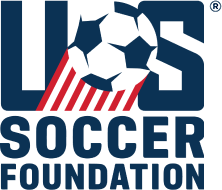

Data show mini-pitches are expanding free, safe access to play in under-resourced communities nationwide
Washington, DC—A decade after the U.S. Soccer Foundation began installing mini-pitches, a new evaluation by NC State University finds that 6.5 million children now live within a half mile—roughly a 10-minute walk—of one. In addition, the evaluation found that 70% of mini-pitches are in under-resourced areas that rank low in the quality of resources and conditions that matter for children’s healthy development. This is important given that underserved communities are four and a half times more likely to lack recreational facilities than more affluent and high-income areas, according to the National Institutes of Health.
“Mini-pitches are more than just safe places to play—they transform communities, strengthen community cohesion, and provide more opportunities for structured and free play,” said Ed Foster-Simeon, President & CEO of the U.S. Soccer Foundation. “They help kids stay active, build confidence, and connect with coaches and peers in a positive, supportive environment—benefits that last far beyond the pitch.
The evaluation also found that mini-pitches increase community engagement and fuel the growth of the sport.
These findings align with survey data collected by the U.S. Soccer Foundation, which show that 99% of respondents say people in their community are more active after a mini-pitch is installed, 98% say the community feels safer, and 91% say the mini-pitch serves as a community hub. The Foundation makes a concerted effort to ensure that high-quality programs are offered at mini-pitch sites, including the Foundation’s evidence-based programs Soccer for Success and Just Ball.
To date, the U.S. Soccer Foundation has installed more than 800 mini-pitches nationwide and is on track to install 1,000 by the end of 2026. Last year alone, the Foundation engaged more than 1 million youth in its programs nationwide. Since the first mini-pitch was installed in 2015, major corporations, organizations, and athletes have teamed up with the Foundation to create mini-pitches in underserved communities across the country.
Major supporters of the work include adidas, the DICK’S Sporting Goods Foundation, Target, Major League Soccer, Musco Lighting, and Griffin Catalyst, the civic engagement initiative of Citadel Founder and CEO Ken Griffin. Notable athletes who have partnered with the Foundation include Tyler Adams, Tim Howard, and Alex Morgan, among others.
The Mini-Pitch System™ was designed by Musco Lighting alongside the U.S. Soccer Foundation and is complete with lights to increase the number of hours children and adults use the space, benches to watch play unfold, ADA-compliant access, and lockable storage for equipment.
“Seeing this report and the impact of this movement shows how powerful the Foundation’s vision was when they started this important work 10 years ago,” said Eduardo Zamarripa, Musco’s Director of Youth Sports Market Development. “Musco has always believed strongly in expanding recreational opportunities for youth and families. We continue to be impressed by the dedication of the Foundation and all of the partners involved, and we look forward to keep building on this momentum in the years to come.”
The Foundation’s mini-pitches support its mission to provide underserved communities access to innovative play spaces and evidenced-based soccer programs that instill hope, foster well-being, and help youth achieve their fullest potential.
The U.S. Soccer Foundation is leading national legacy efforts to ensure the FIFA World Cup 26™ contributes to positive social impact in the years before and following the tournament, working with several Host Cities to create mini-pitches and support proven programs including FIFA World Cup 26 New York New Jersey™, FIFA World Cup 26 Philadelphia™, and FIFA World Cup™ Boston 2026.
To learn more, find a mini-pitch near you, and view the full evaluation, visit: minipitch.org.
About the U.S. Soccer Foundation
As the national leader for sports-based youth development in under-resourced areas, the U.S. Soccer Foundation is on a mission to let soccer do what it does: change absolutely everything. Founded as a legacy of the 1994 FIFA World Cup, the Foundation provides underserved communities with access to innovative play spaces and evidence-based soccer programs that instill hope, foster well-being, and help youth achieve their fullest potential. Headquartered in Washington, D.C., the U.S. Soccer Foundation is a 501(c)(3) organization. For more information, visit www.ussoccerfoundation.org or follow us on LinkedIn and Instagram.